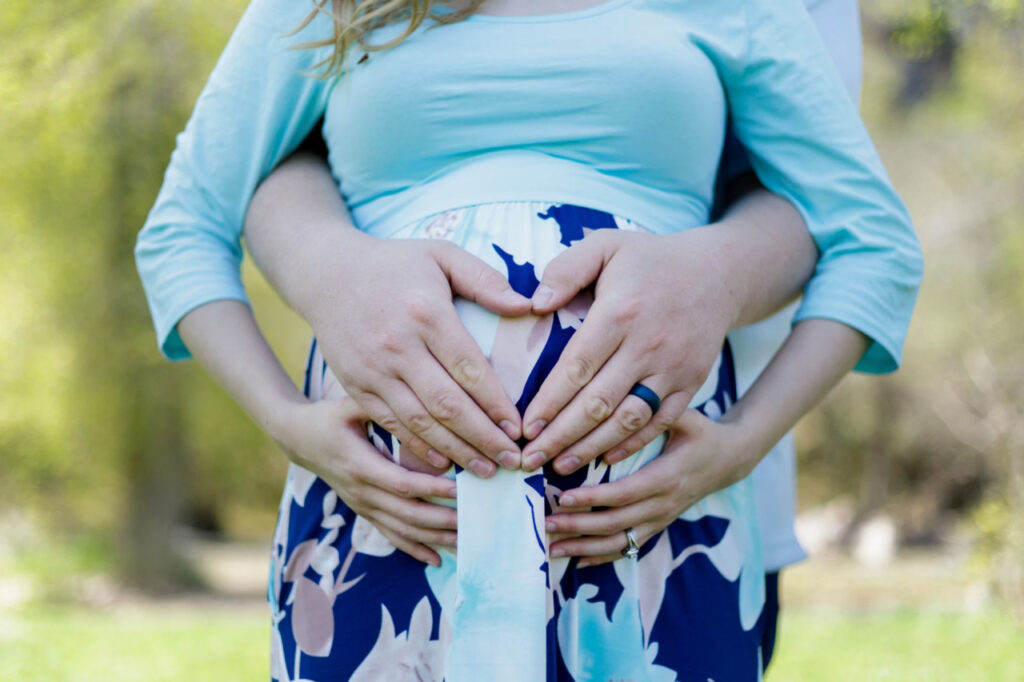Congratulations! If you’re reading this, you or a loved one are expecting a new addition to the family. While exciting, this time can also be very intimidating. As a mom-to-be your body will be changing in more ways than one, and as a dad-to-be you might be asked to do more. Here are just a few of the things you can expect when you’re expecting.
Hormone Changes
A major hormone during pregnancy is the Human Chorionic Gonadotropin, known as HCG.
Produced by the placenta, the basic job of HCG is telling a woman there’s a life-form growing in her body and that she needs to build a refuge for it. It also communicates with the ovaries to shut off the production line. These levels rise eight days after ovulation, and peak between 60 and 90 days. Women with higher levels experience more nausea and vomiting; many doctors believe that HCG is a major contributing cause of morning sickness.
Progesterone and estrogen are also affected early in the pregnancy. Progesterone relaxes the smooth muscle in the body, which can lead to lower than normal blood pressure, dizziness, heartburn, increased hair growth, and constipation. Estrogen plays a key role in the development of your baby. Elevated levels may prompt spider veins, nausea, increased appetite, and skin changes.
Toward the end of the pregnancy, you’ll experience an increase of the milk-producing hormone prolactin. It prepares your breast tissues for lactation and release of milk, and has a tranquilizing effect. Likewise, relaxin and oxytocin are important hormones responsible for loosening ligaments that hold the pelvic bones together as well as relaxing the uterine muscle, stretching the cervix, and stimulating the nipples to produce milk. Due to the loose ligaments, you may experience body aches, clumsiness, and increased inflammation.
Fun fact: You know the “nesting” behavior women often display weeks before delivery? Doctors and professionals believe this may be linked to oxytocin and other hormones.

Growing Pains
As your child grows, so does your body. During each trimester, your body is going to be experiencing new changes in addition to the hormones.
First trimester
The first thing you are going to notice is a tell-tale sign you’re expecting: your period stops. During the first trimester you may also experience extreme tiredness; tender, swollen breasts (your nipples might also stick out); an upset stomach with or without throwing up (morning sickness); cravings or distaste for certain foods; mood swings; constipation; frequent urination;, headaches; heartburn; and weight gain or loss.
Fun fact: You may end up craving a food you despise, or a mixture of foods and condiments you might not otherwise combine.
Second trimester
The second trimester marks a turning point for the mother and fetus. You will usually begin to feel better and start showing the pregnancy more. Because of the development you are going through you may have more body aches. You might also notice stretch marks on your abdomen, breasts, thighs, or buttocks.
Another development to be aware of is called the mask of pregnancy. You may start to see patches of darker skin over parts of your face including your cheeks, forehead, nose, or upper lip.
It isn’t uncommon for you to feel tingling or numbness in your hands either. If that isn’t enough, your ankles, fingers, and face may swell, too. However, if you start to notice any sudden or extreme swelling combined with quick weight gain, call your doctor right away; these are symptoms of preeclampsia.
Third trimester
Around 28 weeks, mothers might start to have braxton hicks, otherwise known as false labor. For most first-time moms, these can be very scary. Don’t panic! Keep track of the contractions; if they aren’t close together and are irregular, just sit down or rest. Sometimes the contractions will stop if you change positions or rest. In true labor, contractions will continue even after you move or rest. Other things you may undergo in the last trimester include shortness of breath, heartburn, more swelling, tender/leaky breasts, trouble sleeping, crazy dreams, clumsiness, and lack of bladder control.
As you near your due date, your cervix becomes thinner and softer. This process, called effacing, is natural and helps the birth canal to open during the birthing process. Get excited — the final countdown has begun!
A Note for Dads
As your significant other experiences these physical and hormonal changes, you may go through different stages and feelings, too. It’s normal to feel excited one minute and scared out of your mind the following. You may even go from feeling prepared to asking yourself, “Will I be capable of caring for a baby?”
While your body and hormones are not changing, let yourself feel all the emotion as it comes. You can take steps to get more comfortable during the pregnancy and embrace the idea of parenthood as the time passes. You’ll have nine months to catch up on reading and research so you can be assured when the baby arrives!
When it comes to dealing with mood swings, the biggest piece of advice we can offer is to be patient. Instead of getting frustrated or angry when there is a sudden burst of emotion from your significant other, take a deep breath and offer understanding and reassurance or a shoulder to cry on.
Here are a few more tips for expecting fathers:
- Talk, read, and sing to your baby-to-be. Did you know studies show babies can hear during the second trimester of pregnancy, and even recognize voices in the third trimester?
- Attend doctor’s visits as often as you can. Hear the first heartbeat, discover if you’re expecting a boy or girl, and take these opportunities to track your baby’s growth and development. By going to the Ob/Gyn checkups, both parents begin to feel connected to their little one even before they are born.
- Try a class for expectant parents. From co-parenting to birthing classes, attending these together can be a great bonding experience between the three of you.
- Support healthy habits. Your encouragement helps mom eat the right foods and avoid smoking and drinking during pregnancy. For example, research shows that your support makes it easier for mom to begin and continue breastfeeding.
- Talk to other dads. By talking to your friends, coworkers, or family members, you might be able to get some peace of mind. Talking with the guys gives you a chance to learn what to expect when the baby does arrive as well as the chance to wrap your head around the change.
- Be there for labor and delivery. Both moms and dads naturally worry about the labor and delivery process. Some dads say they worry about doing the wrong thing in the delivery room, seeing their partner in pain, or being left out of important decisions. But they show up and most are glad they did.
Did you know there’s a support line for expectant fathers? Mensline is available over the phone or through chat to provide any counseling and support you might need!
Some studies show that having both partners in the room has reduced anxiety and pain during delivery. Besides, any anxiety you might have will disappear the moment you’re able to hold your son or daughter!

From Parents in the Black Hills
These three have already been through it, and they have some advice for you. Black Hills parents Lindsey Robinson, Brittany Steward, and Michelle Klein share their best piece of advice for first-time parents.
For starters, it’s important to remember that while this might be intimidating, you have support all around you. Lindsey shares, “It’s okay to ask for and accept offers of help; you’re going to need it during and after your pregnancy. The last thing you’ll want to do with a new baby at home is all the extra household cooking and cleaning chores. Let your family and friends lend their helping hands (trust me, they want to) while you focus on yourself, spouse, and child.”
Parenting is tough, but Brittany offers some peace of mind. She reminds us that it isn’t a skill we’re born with; instead, she says, “It’s something we learn with each smile, cry, diaper, and giggle! Each day you’ll feel like you’ve missed it in some way, but really it’s just us being hard on ourselves. Take it a day at a time, and know that your baby thinks you are the greatest mom or dad they’ve ever known!”
Lastly, Michelle reminds parents that you shouldn’t put pressure on yourselves with expectations. “Toss those right out the window and just be present and focused for all the amazing highs and lows that come with giving birth to another human being!”
Written by and Photos by Sarah Richards

